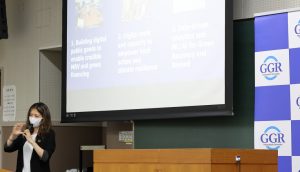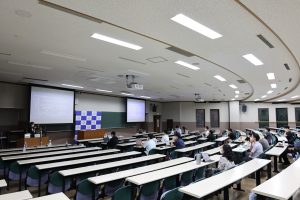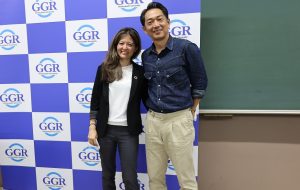On August 4, 2022, the Institute for Global Governance Research (GGR) hosted a talk session featuring Ms. Reina Otsuka, a Digital Innovation Specialist with the United Nations Development Programme (UNDP). This session was held as part of the Summer Intensive Course “SDGs in Theory and Practice (Research in International Political Economy).” There were over 60 participants, and a variety of discussions took place.
After graduating from the Faculty of Law at Hitotsubashi University in 2004, Ms. Otsuka worked in sales and business planning at Recruit Co., Ltd. She then established Ecotwaza Co., Ltd. and became its president. Through her work at Ecotwaza, she became aware that its business was mainly geared towards developed countries, whereas she wanted to send her technology to developing countries. She therefore transferred her company, and enrolled in and completed a master’s program at Harvard University. She then worked as an Environmental Specialist at the UNDP Rwanda office, and since 2020 she has been working as a Digital Innovation Specialist at the UNDP headquarters, focusing on climate change and energy issues.
Ms. Otsuka first mentioned the relevance of digital transformation (DX) to UNDP, which has identified three solutions for achieving the Sustainable Development Goals (SDGs) for 2030: digital, strategic innovation, and finance. In this context, her central work is how to combine environmental energy and digital innovation.
Indeed, 2.9 billion people in developing countries still live without Internet access, and they face diverse fundamental challenges related to digital issues, such as the high cost of government digital infrastructure and the inability to share data. Digital is often thought of as an area to be tackled by a small portion of the private sector, but UNDP, under its “inclusive whole of society digital transformation” approach, sees not only the private sector but also public sectors and citizens as important actors. In developed countries, the private sector contributes the majority of the cost of innovation, whereas in developing countries, the public sector contributes 90% of the cost, and the majority of the cost is not funded by taxes, but by external sources. Therefore, how to innovate from within the society is very important.
The next discussion was on how UNDP has been attempting to address climate change and environmental issues using DX. In practice, workshops and consultations have been conducted first, and the research report on what needs exist in developing countries was published this year. The results revealed a high need for Digital Public Goods, Local Action, and Data Driven Analytics and Machine Learning/Artificial Intelligence (ML/AI). New ideas based on these needs are currently required.
Finally, Ms. Otsuka presented some cases of UNDP’s implementation. The UNDP Data Futures Platform, which she played a central role in establishing, compiles and disseminates socioeconomic data on infectious diseases, drawing lessons from the lack of relevant data at the beginning of the COVID-19 pandemic, which hampered COVID-19 control efforts. The project is significant in that she established a new website in eight weeks, whereas projects usually move in months. She also introduced a joint project between Rwanda’s Meteorology Agency and the University of Tokyo. In an area where meteorological data is not available in Rwanda, the IoT was exploited to innovate in order to transmit information to farmers and others. People from the local technical high school and other institutions came up with ideas themselves, and two of the ideas ended up being purchased by the agency.
Other quotes:
We also introduce other notable quotes in the following list:
- [Regarding the Digital Innovation Approach] We adopt two approaches: “Lean Startup” and “Digital Thinking.” In the former, we first try to create something that will benefit users in a small scale, and then iteratively improve it. If it works well, then we turn it into a project. However, UNDP is at odds with this approach because we have to do what we plan to do with the funds we receive. So now we are forming a new pipeline of innovation.
- [Regarding the Joint Project between the Rwanda’s Meteorology Agency and the University of Tokyo] Instead of a solution proposed by the UNDP side, we involved people from the local communities, such as from the local technical high school to make use of the ideas of the local people… The actual idea they came up with was to develop a system to input numerical values into cell phones, since there is a time difference when temperature and other data have to be written on paper and converted into data. It is not a long-term solution, but small ideas like this are important.
- [In response to the question of what “foreign aid” to developing countries should look like] I have found the answer in my experience in Rwanda. There are many enthusiastic people in the government, but they are looking for technical support. They are called “Development Partners,” but gradually I became less conscious of supporting them and more conscious of providing technical support. In addition, when talking with beneficiaries (users) such as farmers, they actually have some kind of know-how and there is much to learn. It is important to understand them, such as what kind of know-how they have, in order to bring about innovation from within society.
【Event Report prepared by】
Yuji Hijikata (Master’s student, School of International and Public Policy, Hitotsubashi University)



